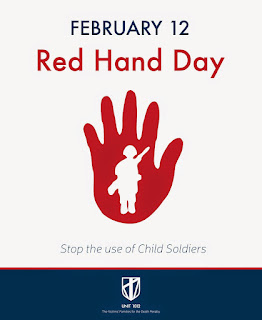Childhood Stolen
"The impact of armed conflict on children is everyone's responsibility. And it must be everyone's concern."- Graca Machel.
The world as we know it has never had a prolonged time of peace. Children around the world continue to suffer from the consequences of conflicts and are still being used as replaceable fuel of war. Despite repeated calls for peace, globally, there are pockets of armed conflicts as the geopolitical dynamics and diplomacy are rather fluid constructs. Children are always the most vulnerable in times of conflict. Sadly, we have seen children used as human shields as well as suicide bombers. War is a multi-billion industry and many countries invest heavily in arms and other weapons of mass destruction. The Stockholm International Peace Research Institute (SIPRI) states that almost US$2trillion was spent on arms in 2020. The five highest spenders were the United States, China, India, Russia and the United Kingdom.
February 12th is the International Day against the Use of Child Soldiers or Red Hand Day. Around the world, children are associated with, and used during, armed conflict with devastating effects on both the child and society. Being a child soldier has a broad-based definition. A child associated with armed conflict is not limited to children who engage in the fighting, as children are often used by parties to a conflict as cooks, messengers, and/or for sexual purposes. Research indicates that many armed groups especially recruit or capture children because they are easy to physically and mentally manipulate.
Geneva Convention
The Geneva Conventions and their Additional Protocols, a series of rules that apply in armed conflict, provide special protections to shield children from the effects of war. For example, Additional Protocol I and II and the Convention on the Rights of the Child prohibit children under the age of 15 from being recruited into armed forces or armed groups. The Geneva Conventions also protect children under 15 by providing them special protection.
The Optional Protocol to the Convention of the Rights of the Child is another important piece of international law that sets out to protect children associated with armed conflict. Under the Optional Protocol, States Parties must ensure that those under the age of 18 are not compulsorily recruited into their armed forces. Adopted by the UN General Assembly in 2000, the Optional Protocol on the Involvement of Children in Armed Conflict (OPAC) raised the 1977 standard by barring the use of anyone under the age of 18 in conflict. OPAC states that individuals under the age of 16 cannot be enlisted to fight and individuals between the ages of 16 and 18 cannot be compelled to join an armed force. It is a war crime under international law to enlist, conscript, or use children under 15 actively in hostilities, whether it is in a conflict between states, or between armed groups and/or state forces.
Countries with Child Soldiers
The United Nations has identified 14 countries where children have been widely used as soldiers. These countries are Afghanistan, Colombia, the Central African Republic, the Democratic Republic of the Congo, Iraq, Mali, Myanmar, Nigeria, the Philippines, Somalia, South Sudan, Sudan, Syria, and Yemen. In 2017, the advocacy group Child Soldiers International estimated that more than 100,000 children were forced to become soldiers in state and non-state military organizations in at least 18 armed conflicts worldwide. The UN further reported that a majority of these children were actually under the age of 15 and that 40 percent of them were girls. Regrettably, children who are used as soldiers in armed conflicts oftentimess loose access to education, playtime, healthcare and other basic rights. The ongoing COVID-19 pandemic has further exacerbated the situation. It is a grave violation of their human rights.
A Global Solution
The first step toward mitigating the use of child soldiers globally is to work with the UN to have all recognized countries sign OPAC. Recognized state actors that continue to pay for or recruit children as soldiers must be sanctioned. Last but by no means least a comprehensive oversight entity should triage multiple needs, channeling funding to the most pressing issues facing child soldiers, notably counseling, healing, and rehabilitating former child soldiers for their return to society. This will be a multi-year effort. Our patience needs to match the impact that combat imprints on the exploited youth of our world. The international community needs to redouble its efforts in ensuring that children are protected. By remaining silent we become part of the problem. Children should be allowed to enjoy their childhood.
In the words of Olara Otunnu, compelled to become instruments of war, to kill and be killed, child soldiers are forced to give violent expressions to the hatreds of adults.
Wayne Campbell is an educator and social commentator with an interest in development policies as they affect culture and or gender issues.
waykam@yahoo.com
@WayneCamo
©
#ChildrenNotSoldiers #RedHandDay




Comments
Post a Comment